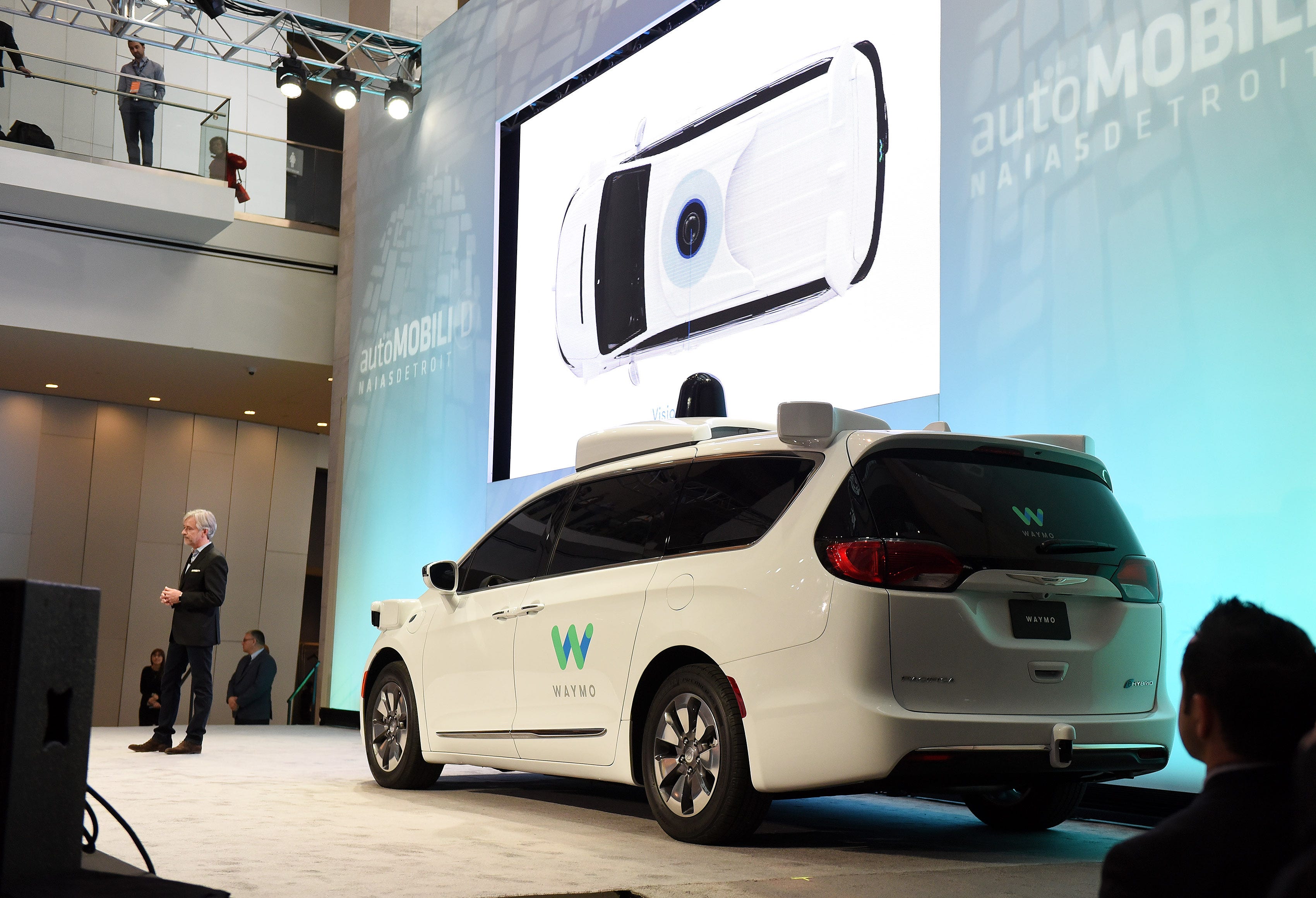AutoX to launch robotaxi service with Chrysler Pacifica minivans
 Breana Noble
Breana NobleThe Chrysler Pacifica hybrid minivan is becoming the self-driving vehicle of choice for robotaxi services.
AutoX this week said it was partnering with the Italian American automaker to deploy a self-driving fleet early this year in China and eventually the United States. Fiat Chrysler will supply minivan mules for the service like it does for Google affiliate Waymo LLC's Phoenix service. But leaving the development of the technology up to technology companies may be leaving Fiat Chrysler behind, some experts say.
"Most of us would agree that if you ask them, they have become a hardware company," said Frederic Bruneteau, managing director in Brussels for Ptolemus Consulting Group, who authored a recent report warning the company could become a "de facto Tier-1 supplier."
"They have been very successful at it, but at the end, it is what it is — a hardware platform. That strategy could be dangerous in the long-term."
AutoX announced its partnership with Fiat Chrysler during the Consumer Technology Association's CES trade show in Las Vegas. The start-up is based in Hong Kong and San Jose, and is backed by Chinese e-commerce giant Alibaba Group Holding Limited. It will begin rolling out an initial fleet of 100 vehicles, including the Pacificas, during the first quarter in Shenzhen, a Chinese city of about 20 million people. AutoX has been testing its platform there in the fog and torrential rain since early 2019.
"We are pretty much the only company that can handle downtown, congested traffic" in China, said Hugo Fozzati, AutoX's head of business. "When you think of other players, they are testing in more sunny conditions where it's a lot easier. We're tackling the most difficult problem first to then scale it back if we need to in easier areas."
Anyone in the city will be able to access through WeChat and other smartphone apps the robotaxi that will have a safety driver. It also plans to roll out the xTaxi service with Pacificas in California, where it also has tested its technology, though a timeline has not been set.
The company installs on top of the vehicles its package of lidar and radar sensors, and high-definition cameras that can detect thin lines of about an inch, which is helpful in urban settings. A control unit powers the technology and integrates it into the vehicle for "Level 4" high-automation driving in which the car can perform all functions under certain conditions, though a driver can intercede.
Eventually, AutoX hopes to license its technology to automakers, ride-sharing companies and third-party operators, Fozzati said. The company chose the Pacificas for their roomy space and redundant electrical systems for braking and steering that make the vehicle safer, he said. It also has tested its technology on Lincoln MKZ sedans and other vehicles.
The partnership is similar to the one Fiat Chrysler has had with Alphabet Inc.'s Waymo since 2016. Waymo has a contract to buy up to 62,000 Pacifica Hybrids for its self-driving fleet. In 2018, Waymo launched a robotaxi pilot in Phoenix and is outfitting vehicles with its autonomous technology at an American Axle & Manufacuring Inc. facility in Detroit. Waymo also is exploring licensing its technology to automakers.

And in June, Silicon Valley startup Aurora Innovation Inc. said it would integrate its self-driving system into Fiat and Ram commercial vehicles to provide the brands' customers autonomous options.
Relying on partnerships
The latest agreement is another example of Fiat Chrysler outsourcing the creation of the futuristic software and hardware. Meanwhile, to develop self-driving technology, General Motors Co. acquired San Francisco-based Cruise LLC and Ford Motor Co. has a majority stake in Pittsburgh's Argo AI LLC.
Fiat Chrysler's strategy of supplying vehicles to technology companies could relegate the automaker to supplier status, Bruneteau said, which could harm the value of the company.
"What makes OEMs successful today is they can integrate a lot of very complex technologies and launch them in a safe and affordable way, which is not as easy as it sounds," he said. "If they are completely dependent on an AI player, that would be a pretty good block of their vehicles that doesn't belong to them. It really happens to reduce enormously the value they create."
Relying on partnerships, however, does help Fiat Chrysler stay in the autonomous-vehicle sphere while keeping costs low.
"FCA’s approach to rapid advancement of AV technology is through smart and strategic collaborations that promote a culture of innovation, safety and know-how," an FCA spokesperson said in a statement.
Searching for identity
Autonomous vehicles took a step back after an Uber self-driving car hit and killed a pedestrian in Phoenix in 2018, notes Sam Fiorani, vice president of global vehicles forecasting at AutoForecast Solutions. And how the business model will operate is yet to be determined.
"With autonomy, we're not really sure yet if the brand on the vehicle will be the selling point," he said. "Today, you buy the car because it's the image you want to provide to everybody else. Will I drive a Chrysler or Chevrolet autonomous vehicle or one that's powered by Waymo? That hasn't shaken out yet."
Companies are assessing how consumers see self-driving services. The latest Waymo vehicles built in Detroit do not have Waymo branding on the vehicles' sides, unlike the original fleet of Pacificas it launched.
"Our thinking has evolved on this," Waymo CEO John Krafcik said in October in Detroit during the Forbes Under 30 Summit. "If you look at the Chrysler Pacifica with the Waymo driver installed, it sort of looks like a self-driving minivan by Waymo. That's what you think when you see this thing. That's not really what we want.
"The ride itself will have its own identity. ... In this way, I think we can have brand identities for both the driver as well as the car itself. That's what we're shooting for."

Fiat Chrysler also is moving ahead to obtain the approvals needed to merge with French automaker Groupe PSA, which Bruneteau also noted had fallen away from Level 4 autonomous technology development in favor of less-ambitious automated systems. But the merger could help to provide the engineering talent and size needed for the companies to invest in new technologies.
"Self-driving services are on the horizon, but we don't know how far away the horizon is," Fiorani said. "Investing in all of this technology may not pay off for 10 to 15 years, but you can't afford to not worry about it at this point."
bnoble@detroitnews.com
Twitter: @BreanaCNoble